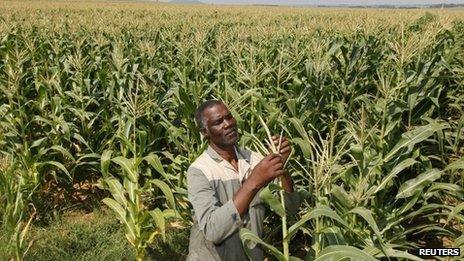Obama unveils US food security plan for Africa
- Published
US President Obama says it is a moral, economic and security imperative to address food security in Africa
US President Barack Obama has announced a $3bn (£1.9bn) plan to boost food security and farm productivity in Africa, US officials say.
They say the initiative is aimed at alleviating shortages as world food supplies are being stretched by rising demand in Asia's emerging markets.
Food security is also on the agenda of this weekend's G-8 meeting.
The summit near Washington is being dominated by Europe's debt crisis and a possible Greek exit from the eurozone.
Mr Obama unveiled the Africa plan ahead of his first meeting with new French President Francois Hollande.
He said investments in African agriculture by private US companies, for a total of more than $3bn, would address "unacceptable" starvation.
"It's a moral imperative, it's an economic imperative and it's a security imperative," Mr Obama said.
"'There is no reason why Africa cannot feed itself."
The president also said that while the summit would address Europe's fiscal situation, it was "also important, also critical, to focus on the urgent challenge that confronts some one billion men, women and children around the world: the injustice of chronic hunger."
The leaders of Benin, Ethiopia, Ghana and Tanzania have been invited to attend the G-8 meeting on food security.
Pull out of poverty
The head of the US Agency for International Development (USAID), Rajiv Shah, said earlier the move showed the administration's commitment to boosting world food production as rising wealth in Asia drives consumption.
"By taking this new approach, we believe that it's possible to move 50 million people out of the condition of poverty and hunger," he told reporters.

The US plan is aimed at increasing farming productivity in Africa
"You cannot have stability and security as long as regions and countries and communities are deeply food-insecure."
The UK and other G-8 nations as well as African countries, aid agencies and multinational companies will also take part in what will be known as the New Alliance for Food and Nutrition Security.
The UK's department for international development said 45 leading firms, including Diageo, Unilever and Vodafone, will invest $4bn (£2.5bn) in developing African agriculture and sign up to a new code of responsible investment.
"Governments cannot tackle this challenge alone. The skills, resources and financial expertise of leading private businesses will help transform African agriculture, giving poor farmers the chance to pull themselves out of poverty, hunger and malnutrition," said the UK's Secretary of State for International Development, Andrew Mitchell.
Bank fears
In recent years, food shortages have led to price rises and unrest in many import-dependent countries, including many in Africa.
In the 2009 G-8 summit in Italy, major industrial countries promised more than $20bn over three years to improve food access to Africans and others hit by high prices.
This latest summit, will also publish an accountability report over the weekend, which is expected to show how much of the food funding has yet to be delivered.
However its main focus will be continuing concerns that the eurozone debt crisis could trigger a global slump.
On Thursday, confidence in European banks was undermined by ratings agency Moody's, which cut the credit ratings of 16 Spanish banks.
Mr Obama has urged European leaders to do more to stimulate growth, fearing the euro crisis could spread to the US.
Correspondents say he will seek to cement a bond with France's new president, Francois Hollande, at the White House before heading to Camp David for the summit.
Mr Hollande, who took office on Thursday, has also said a German-led plan to enforce fiscal discipline across the eurozone should be complemented by moves aimed at boosting growth.
- Published15 May 2012
- Published3 May 2012